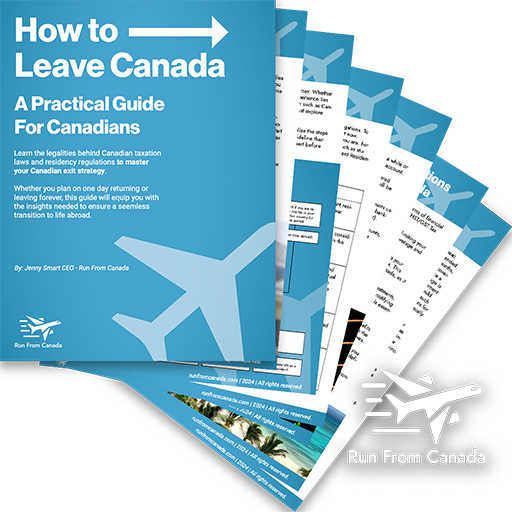It seems like more and more Canadians are packing up and leaving while sliding into a new socio-economical class called a ‘Canadian Economic Refugee.’ It’s clear, the Canadian Dream, which used to be a beacon of hope attracting people from all over the world, isn’t shining brightly anymore and there’s been an explosion in the amount of Canadian Emigrants leaving this country.
It’s not just those looking for better weather; we’re talking about single semi-wealthy professionals, well-off immigrants, and even retirees who are deciding to call it quits on Canada.
So, what’s going on? Is Canada really becoming a less desirable place to live? Stick around, because we’re diving deep into this phenomenon. From economic strains to seeking out better lifestyles, we’ll explore why an increasing number of Canadians are opting to leave. Plus, we’ve got some insightful guides to help you figure out if making a move outward is right for you, too.
Reason 1. Economic Armageddon has Hit Canadians
Ask the average Canadian about their financial situation, and you’ll likely hear that their current wages barely cover their rent. Scroll through Canadian Reddit and you’ll see that job hunting (and job-keeping) has become like finding a needle in a haystack.

When you chat with the average Canadian about their financial health, the picture painted is often grim. Many will tell you that their current wages are barely keeping up with rent, and a quick look at discussions on Canadian Reddit confirms that securing a job—or just holding onto one—is becoming extraordinarily difficult. It feels a bit like searching for a needle in a haystack.
The economic challenges facing Canada are complex and have been detailed extensively in some of our other pieces (link to articles). However, understanding why an increasing number of Canadian emigrants are choosing to leave requires a broader perspective.
We are witnessing a significant downturn in stable full-time job opportunities, compounded by a rise in crime rates, a growing mistrust in Canadian institutions, and intense competition for even the most basic entry-level positions. This competition is exacerbated by high levels of immigration, which, while enriching Canadian society in many ways, also adds pressure to the job market and public services.
These factors collectively cast a shadow over the prospects of future generations in Canada. Both new immigrants, who arrived fueled by dreams of prosperity, and long-standing residents are feeling the pinch. Their disillusionment is not just with the economy but with a society that seems increasingly unable to promise stability or upward mobility.
Consequently, we’re seeing both skilled Canadians and newcomers—who have only recently laid roots here—opting out of Canadian society in search of better opportunities. This burgeoning trend of Canadian emigrants, often well-educated and highly capable, are not just fleeing economic hardship but also seeking communities where their skills are met with fair economic rewards and a stable socio-economic environment.
It might seem surprising to some – “Who would leave Canada for a better life?” – yet the numbers speak for themselves. Approximately 4 million Canadians are living abroad and they’re not looking to return anytime soon. Furthermore, reports also show that those people who came here seeking a better life, are now starting to leave. And their Canadian citizen counterparts are following behind.
Reason 2: Canadian Emigrants are Fed Up with the Stagnant Canadian Job Market
Let’s delve into the job situation in Canada which many Canadians and new immigrants are realizing is demoralizing. Contrary to the rosy picture painted by government statistics, the reality of Canada’s economy tells a different story than success. A quick browse through Canada’s official Labour Force Survey from October 2023 to January 2024 reveals a concerning trend:
| October 2023 | November 2023 | December 2023 | January 2024 | |
| Full Time Jobs | -3.3K | +59.6K | -23,5K | -11.6K |
| Part Time Jobs | +20.8K | -34.7K | +23,6K | +48.9K |
This data, although seemingly erratic, shows a small increase in low quality part-time employment but a large decline in good quality full-time jobs. The reduction in good-paying full-time jobs is a stark warning sign for Canadian emigrants who are seeking a middle class livelihood here.
Furthermore, Canadian politicians may tout a flourishing economic landscape, but the reality, especially from October 2023 on wards to today, reveals a consistent loss of full-time jobs, except for a temporary spike in November, likely due to seasonal hiring for the holidays. Moreover, it’s concerning that the few full-time jobs being created, if any, are predominantly in the public sector, leading to an inflated government workforce which can be a double edge sword for those innovative types.

A report by the Fraser Institute highlights Canada’s sluggish pace in innovation, suggesting that tax reforms could boost incentives for entrepreneurs. Additionally, there’s been a noticeable year-over-year decrease in self-employed individuals, as seen in the table above further signalling tough times in Canada’s labour market.
The lack of private sector job growth and environment to stoke entrepreneurship, coupled with the unavailability of housing and scarcity of jobs in Canada’s few science and technology hubs, is driving away creative entrepreneurs. as many aim to seek economic freedom elsewhere.
Reason 2: Rising Crime Rates and Distrust of Canadian Institutions
The disconnect between the government’s optimistic economic outlook and the public’s perception feeds into our next point: The expanding distrust of Canadian institutions. In recent times, trust in Canada’s institutions popularity scores have plummeted to an unprecedented low with the people of Canada.
Across various areas of the Canadian society, there’s a burgeoning narrative of scandal that makes the average citizen think twice if Canada really has their back.
From iconic institutions like the RCMP, once revered as a symbol of Canadian freedom, is now mired in controversy and dwindling public trust, to the telecom behemoths whose whimsical layoffs and abrupt programming cuts betray a disconcerting disregard for societal impact. Even the Federal Port of Montreal hasn’t been spared, increasingly seen as complicit in the rising car-theft crisis that plagues Southern Ontario.

During these challenging times, the governmental response has been underwhelming to say the least. Occasional hearings and allocations of funds have rarely managed to scratch the surface of the issues at hand, leaving many Canadians feeling unsupported and disregarded by their leaders. This minimal action has only deepened the public’s skepticism of Canadian government and increased the attractiveness of leaving Canada entirely.

Explore Your Opportunities Abroad
Use the Canadian Exit Guide to see how you can leave Canada to find better opportunities abroad.
This growing disenchantment isn’t limited to natural Canadian residents. Newcomers, drawn by Canada’s social contract of working hard will provide you a stable and prosperous future, are facing a stark reality. They’re discovering that their representatives that are supposed to fight for this, seem increasingly indifferent. The frustration is palpable among these new immigrants who feel they were sold a dream far removed from their current experiences.
Who can blame them for looking elsewhere? Canadians, both native-born and those who have chosen Canada as their new home, are starting to seek out countries where the social fabric is more intact. This exodus reflects more than a desire for a temporary change of scenery, it’s a large indicator of Canada’s declining socio-economic appeal. People are not just leaving; they are voting with their feet.
Reason 3: Housing Insecurity Is Creating Canadian Emigrants
The Canadian housing market in 2024, as outlined by RBC, is a tale of two halves. But, let’s be real, it’s mostly a tale of those who are struggling to find a rental unit for their family or themselves vs. those tiny few who can buy houses by the dozen.
As per RBC’s report, The first half of the year is expected to continue the trend of slower activity and softer housing prices. Eitherway, with Canadian home prices usualy 9.5x the average salary, no matter how high or low the interest rates are, owning a home remains a pipe dream for many.

Sure, there’s talk of interest rates potentially dropping later in the year, which could stir up some action in the housing market and open some doors, But let’s face the reality.
Even with these changes, owning a home is still a far cry for most. We’re looking at a situation where the average Joe and Jen is priced out of the market, and the idea of buying a house in places like Ontario or British Columbia is laughable unless you’re rolling in dough.
And it’s not just about buying houses. Renting isn’t a walk in the park either. Rents have skyrocketed, and if you’re not spending a fortune on a mortgage, you’re probably bleeding cash on rent. It’s like being stuck between a rock and a hard place.
This whole mess is driving more and more Canadians to think about packing their bags and heading somewhere more affordable. And it’s hard to blame the Canadian emigrants when the average two bedroom rent in Thailand can be rented for $400 – $500 USD a month. And there’s no Canadian winter.
The Canadian dream of owning a house with a white picket fence is turning into a fantasy for many. It’s no wonder people are looking at other countries where the cost of living doesn’t mean handing over most of your paycheck just to have a roof over your head.
The Canadian housing market in 2024 is a complex beast that is transforming your classic Canuck into a Canadian emigrant un-proud of their origins.
With high interest rates, un-affordable housing prices, and rents that make your wallet weep, it’s pushing Canadians to reconsider their options. Many are starting to think that maybe, just maybe, there are greener pastures beyond the Canadian border.
Finding Your New Horizon: Is It Time to Leave Canada?
As we wrap up our discussion on the factors pushing Canadians to consider emigration, it’s clear that the decision to leave one’s home country isn’t made lightly. The rising crime rates, eroding trust in institutions, and the relentless housing crisis paint a picture of a Canada at a crossroads. For many, the classic Canadian dream seems more elusive than ever as of 2024.
But where does one go from here?
If these challenges hit home with you, and you’re contemplating a fresh start abroad, you’re not alone. The world is vast, filled with countries offering diverse economic opportunities, much more affordable living, and perhaps a new perspective on work-life balance.
That’s where our “Leaving Canada Quiz“ comes into play. It’s designed to guide you through a series of questions, focusing on economic opportunities and other key parameters, to help you identify a country that might just be calling your name. Whether it’s a nation with booming job prospects, a lower cost of living, or a more stable housing market, this quiz aims to point you in the right direction.
So, are you ready to find out where your next adventure lies? Maybe it’s a bustling city in Europe, a serene town in New Zealand, or a vibrant metropolis in Asia. The possibilities are endless. Take the quiz below now and discover a country that works for you based on your parameters. Thank you for reading.
Looking to leave Canada?
Take the country quiz to see where you belong!


Leave a Reply